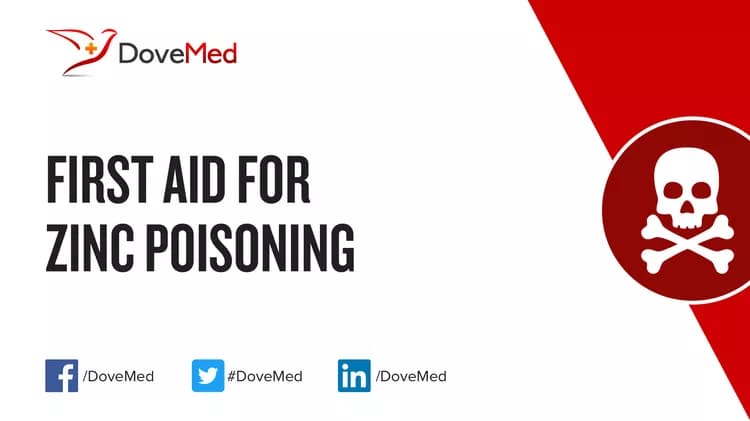What is Zinc Poisoning?
- Zinc (Zn) is a mineral found in all bodily tissues, but especially concentrated in the eye, bone, and male reproductive organs. It plays a key role in many body functions
- The body gets zinc from dietary sources. However, zinc is also present in batteries, plastics, paints, galvanized coatings, etc.
- Zinc Poisoning is the accidental or intentional intake of compounds containing zinc in large amounts
- The condition is diagnosed based upon the clinical history, combination of signs and symptoms, and additional tests (that may include, in some cases, radiological studies and laboratory tests)
Zinc Poisoning may be also referred to as Zn Poisoning and Zinc Toxicity.
What are the Causes of Zinc Poisoning?
- Zinc Poisoning is caused by ingesting zinc-based compounds in significant amounts
- This intake could be accidental, or in some cases intentional, to bring self-harm
- Apart from zinc obtained through diet and medications, zinc is also found in the form of zinc compounds such as zinc chloride, zinc oxide, zinc acetate, zinc phosphide, zinc sulfate, and zinc complexes. Common zinc products include paints, rubbers, anti-rust coatings, preservatives, etc.
Note: The compound can interact with other prescribed or non-prescribed medications in the body. Such interactions may enhance the therapeutic effects of the drug or other medications being taken, resulting in undesired side effects (such as an overdose).
What are the Signs and Symptoms of Zinc Poisoning?
The signs and symptoms of Zinc Poisoning can vary from one individual to another. It may be mild in some and severe in others. The signs and symptoms may include
- Irritation of mouth, throat, due to burning sensation
- Coughing and breathing difficulties
- Nausea, vomiting
- Fatigue and body pain
- Diarrhea that may be watery or bloody
- Fever and chills
- Stomach or abdominal pain
- Reduced blood pressure (hypotension)
- Yellowing of the eyes and skin (jaundice)
- Skin rashes
- Urination difficulties including absence of urine
- Shock and seizures
- Collapse of the body
How is First Aid administered for Zinc Poisoning?
First Aid tips for Zinc Poisoning:
- Call 911 or your local emergency help number for emergency assistance
- Call the Poison Control Center at 1-800-222-1222 (or your local poison control center) for further instructions
- Provide them with information such as type of compound taken, quantity and time of ingestion, age, weight and general health status of affected individual
- Confirm that the airways are protected; also, ensure breathing and the presence of pulse
- DO NOT give anything by way of mouth, if the affected individual is vomiting or showing slow response
- Otherwise, following an ingestion of the substance, immediately give milk to drink
- Take individual to emergency room (ER) for further treatment
- Always try to take the product bottle/container to the ER
The emergency medical health professional might perform the following steps towards treating the condition:
- Medically manage symptoms and provide breathing support, if necessary
- Administer activated charcoal to avoid absorbance of the substance in the body
- Administer laxatives for elimination of the substance from the body
- In case of severe poisoning, chelator medications to remove the substance from the body, may be prescribed
- Administer fluids by an intravenous drip line
Who should administer First Aid for Zinc Poisoning?
First aid for Zinc Poisoning is administered by healthcare professionals.
- The individual who is affected, or someone near, should call 911 for emergency assistance (or the local emergency number)
- They should also call the poison control center at 1-800-222-1222 (or the local poison control center) and follow instructions
What is the Prognosis of Zinc Poisoning?
- In case of mild Zinc Poisoning, the condition is usually not life-threatening; once the symptoms are managed, the prognosis is good
- However, in general, the prognosis is dependent on the amount of substance consumed, time between consumption and treatment, severity of the symptoms, as well as general health status of the patient
- Severe toxicity due to zinc may result in severe vomiting. The condition can result in shock and kidney failure. Fatalities have been reported from Zinc Poisoning; sometimes, even after a month
In general, toxicities are common situations in the emergency departments. Most of the cases are often not fatal, when appropriate treatment is given.
How can Zinc Poisoning be Prevented?
Zinc Poisoning can be prevented by:
- Keeping all poisons correctly labeled and in suitable storage locations
- Always following instructions for usage of any household products
- Keeping any poisonous/hazardous chemicals and other materials out of children’s reach
- Being aware of basic first aid steps in case of an emergency (such as inadvertent poisoning)
It is important to give your healthcare provider a complete list of prescription and non-prescription medications that are being currently taken. This will help them in assessing the possible drug interactions within various medications and help avoid/prevent accidental or unintentional toxic drug effects.
What are certain Crucial Steps to be followed?
- Call 911 (or your local emergency number) for emergency assistance, if symptoms are life-threatening
- Call Poison Control Center at 1-800-222-1222 (or the local poison control center) and follow the recommend steps
- It would be helpful if the following information is readily available:
- Type, dosage and time of administration of medication
- Age and weight of the individual
- And, the overall health status of the individual
Related Articles
Test Your Knowledge
Asked by users
Related Centers
Related Specialties
Related Physicians
Related Procedures
Related Resources
Join DoveHubs
and connect with fellow professionals


0 Comments
Please log in to post a comment.